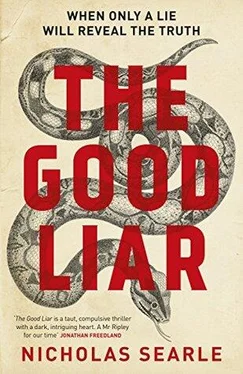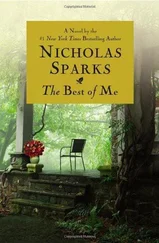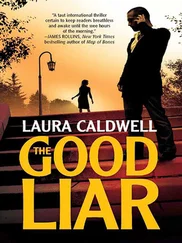Alasdair McLeish liked to do things by the book.
Elisabeth then became a fellow of the college and her life seemed
to be on a straight track to distant retirement. It was she, rather than the demands of her future husband’s career, who changed that
course, applying for a lectureship at Edinburgh. She was successful and while Alasdair completed his studies at Cambridge she moved
to Edinburgh to set out just how she would pursue her research.
Elisabeth McLeish would not have described herself as a particu-
larly contemplative person. The demands of an academic career,
together with the upbringing of her children, would have been suf-
ficient to distract her from introspection had she been that way
inclined naturally. Which in fact she wasn’t.
It was not until 1997 that everything stopped again and she was
237
1ST_9780241206935_TheGoodLiar.indd 237
05/05/15 5:32 PM
delivered back to the spiritual emptiness of 1945. Keenly aware
though she was of her self- indulgence, she felt that all that had been built in her life during the intervening years had been destroyed.
She was smiling when this thought struck her. The occasion was
Alasdair’s funeral, as they waited to enter the church, when her
granddaughter blurted out the question. Blurting was rather Aman-
da’s way.
‘Weren’t you ever fed up with each other?’ she asked, as if it were a requirement of every human relationship. ‘Didn’t you ever just
want to do your own thing?’
With someone she loved less, Elisabeth might have employed a
rather more stern tone. But the query prompted that distant, reflective smile that would be seen on her face in years to come, her eyes following her mind to a distant place. In some part of her she could not stop herself again being pleasantly surprised by Amanda’s lovely sing- song Scottish lilt.
‘Well, I did rather do my own thing,’ she said. ‘Alasdair wouldn’t
have wanted me not to. But my thing was all about stability and
continuity. And friendship. I’m afraid we were rather boring. But
back then individuality wasn’t really regarded as a virtue, least of all in a place like Edinburgh. There aren’t any skeletons in our closet.
We must have been rather a disappointment to you all.’
‘No, no,’ said Amanda. ‘We looked up to you so much. I wish I
could live my life so simply.’
‘It’s a complex world, my dear. Perhaps the 50s were some kind
of respite, or a delusion. My early years weren’t exactly simple.’
‘I know. I didn’t mean. It’s just.’
‘It’s all right. I’ve no lessons to offer. Maybe because I’d had such a tumultuous life I yearned for something more steady and solid.
I’m sure millions of others did after the war. It doesn’t make it right.
But I do feel for you young people, trying to make sense of every-
thing. There, listen to me. So very patronizing. I’m sorry. What was it John Lennon said? Whatever gets you through the night. I’m sure
he was right.’
She was aware that, while her words might appear deliberately
spoken and to make sense, the centre of her consciousness was
238
1ST_9780241206935_TheGoodLiar.indd 238
05/05/15 5:32 PM
elsewhere. This was not such a challenging facility for one who had been accustomed professionally to operating on several levels, mentally constructing a thesis during a boring departmental meeting or internally testing an idea during a tutorial. But it was not something she generally deployed with her family.
It was, she supposed, excusable given the circumstances that she
should be thinking of her dead husband, her parents, her sisters and herself.
Alasdair’s death had been far from unanticipated. Diagnosed
with prostate cancer some four years previously, he had immedi-
ately retired and begun planning the period of between two months
and five years he was told to anticipate. World cruises, sports cars, bucket lists and mawkish farewell parties were not on his agenda: a simple, gentle wind- down with his family was what he sought. He
hadn’t done so badly on the prognosis, he’d said the week before,
when the immediacy of death was so obvious. For her part, Elisa-
beth had deluded herself that she could cope with this, riding her
grief with her customary fortitude. She was, after all, accustomed
to loss.
In fact her life imploded. That detached smile, the fixed display of control, would remain and she would continue carefully to regulate
outward displays of emotion. In private only would there be tears.
She would discipline herself not to lose control of her practical
life – the few pieces of research that continued under her supervision following her retirement, maintenance of the house and
grounds in immaculate condition, diligent attention to her good
causes.
She foresaw all this as she sat without expression in her pew, the
service occurring around her somewhere far away. Grief was to be
expected, she knew, though its self- absorption must be curbed. Her loss was a bottomless well into which she found herself calling con-tinuously, with no echoing response. This much was routine, she
told herself. Was it more than that? She could no more answer that
question than attempt the pointless comparison of her grief with
another’s. It would have been unnatural not to have felt his absence keenly, that man who had been remarkable precisely because he
239
1ST_9780241206935_TheGoodLiar.indd 239
05/05/15 5:32 PM
had seemed so unexceptional to others. Competent, but diffident
and lacking in charisma, would have been the faint praise. Not to
her, nor to her children and grandchildren.
Somehow she must reconstruct. Guilt flooded together with the
pain at her selfishness. Even now she found it impossible to mourn
for her parents and her sisters, whose lives had been unarguably
more tragic and their deaths immeasurably more horrific. Impos-
sible to visualize them in life, she thought as the obsequies played out. Impossible to imagine them as warm, physical beings, with
thoughts and emotions and character, or to think of their deaths.
Let alone to weep.
Some three years later she resolved to discover what had happened,
back then. She had never before sought any answer to the conun-
drum that was her past, never subscribed to theories that she
needed, for true contentment, to winkle out the truth. She had
never looked for that dreadful American thing, closure – being perfectly content for it all to be there, packed in the recesses, never to be aired again – and certainly for not revenge.
But now she wanted to know. She was not sure what precisely
she was seeking: knowledge, the truth, retribution, repayment of
some obscure debt. She engaged Gerald Glover, once a postdoc-
toral researcher under her supervision, now a professor at a
university in the north of England, to undertake research on her
behalf in his spare time. She could have done the work herself but
wanted, for reasons that at the time were uncertain, a demonstrably independent and objective job done of it. Gerald did the work during university vacations, under terms of strict confidentiality,
engaging a series of research students, the last of whom was Ste-
phen Davies.
When she had been Gerald’s academic supervisor in the 1980s, he
had fallen under her unwitting spell. He was more than willing to
undertake the research and interviewed her in her vast granite Bor-
ders house. She talked for more than three hours for the tape,
Читать дальше










![Nicholas Timmins - The Five Giants [New Edition] - A Biography of the Welfare State](/books/701739/nicholas-timmins-the-five-giants-new-edition-a-thumb.webp)

